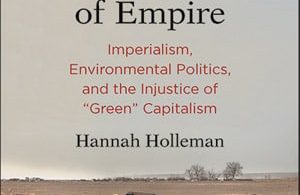Start the new year with these new books for reds and greens. End of the Megafauna. Brave New Arctic. The Big Heat. The End of Ice. Socialist Register 2019.
Scientists: Climate change causing heatwaves, droughts and floods
New report shows that recent extreme weather could not have happened without warming caused by human-induced climate change.
Ocean warming sets new records year after year
The oceans are heating up faster than predicted, and the speed is accelerating. Expect higher seas, stronger storms, and extreme precipitation.
A Call for Ecological Medicine
The health of Earth's ecosystem is the foundation of all health. Individuals cannot live healthy or happy lives in poisoned ecosystems and unhealthy communities.
‘Dust Bowls of Empire’ exposes capital’s global assault on the land
The 1930s Dust Bowl presaged today’s global ecological crises. Hannah Holleman’s brilliant new book shows how and why capital destroys the soil that all life depends on.
Warming hiatus: The climate change myth that refuses to die
Climate science deniers say warming stopped from 1998 to 2013, and temperatures are now falling. Both claims are blatantly false.
The top 15 C&C articles in 2018 … and the all-time top 5
The 137 articles we published in Climate & Capitalism this year were read by more people than ever before. These were the most popular ...
Why Ecosocialism? A discussion of the case for a red-green future
Michael Löwy initiates a wide-ranging debate on the great transition from capitalist destruction to a just and sustainable future
New study: Greenhouse gas is more dangerous than regulators thought
New evidence not only strengthens the EPA’s 2009 endangerment finding, it shows that greenhouse gas impacts could be much worse than expected
A lesson from the yellow vests: Carbon taxes burn workers
Jonathan Neale says climate activists must reject climate taxes: they harm the poor, and do little to actually slow climate change
Left-wing Quebec party will focus on climate change
Québec solidaire, which won 16% of the popular vote in October, will make climate change its main political campaign in the coming year
Exploring the deep biosphere: Organisms abound in regions thought devoid of life
70% of all bacteria live deep in the earth, constituting a reserve of carbon and biodiversity that vastly outnumbers and outweighs all humans combined
Greenland melting is faster than ever … and it is speeding up
“The melting and sea level rise we’ve observed already will be dwarfed as climate continues to warm”
Global warming illustrated: 800,000 years of CO2 in one graph
This year's increase in carbon dioxide emissions from fossil fuels and industry is the largest in seven years. CO2 in the atmosphere has hit a new high.
Ecosocialist Bookshelf, December 2018
Five important new books for reds and greens. Dust Bowls of Empire. Oil, Power and War. The Big Muddy. Never Home Alone. The Neoliberal Diet.
Climate change health impacts: ‘compounded and overwhelming’
Lancet climate change report shows worsening health risks from heat and heatwaves, infectious diseases, and food security
‘Karl Marx’s Ecosocialism’ wins the 2018 Deutscher Prize
Kohei Saito honored for his brilliant study of Marx's views on the relationship between society and nature
The climate report that Trump tried to bury
Summary of major U.S. government report that warns of major threats to human health and safety, quality of life, and economic growth
Herbicides undermine antibiotics, threaten medical care
Study says bacteria develop antibiotic resistance up to 100,000 times faster when exposed to the world’s most widely used herbicides, Roundup and Kamba
New maps of land destruction show why caravans flee Central America
Detailed maps show worldwide land degradation, including the deforestation that is now forcing migrants to leave Guatemala and Honduras





















